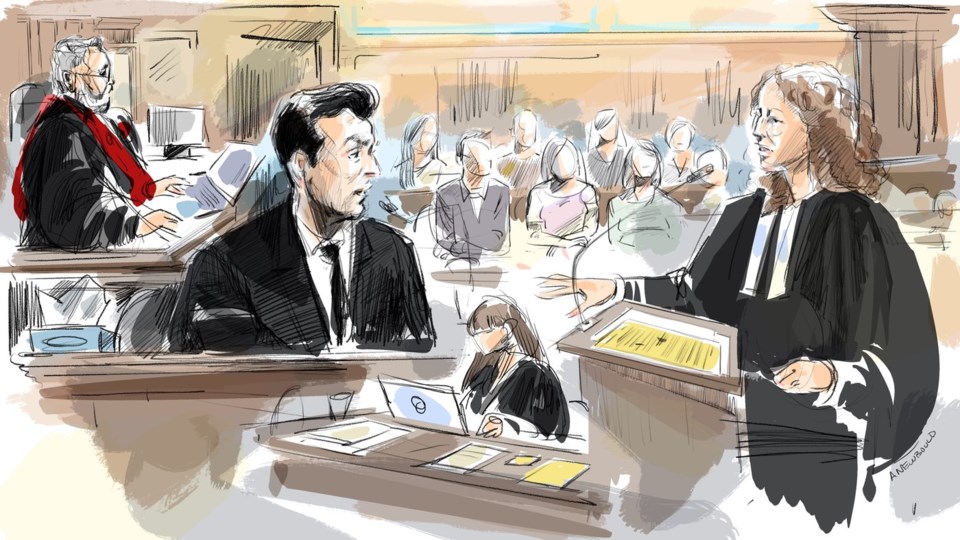Defence lawyers for Canadian musician Jacob Hoggard attacked the credibility of his accuser Thursday as they made their final pitch to jurors in the singer's sexual assault trial, suggesting the woman lied about the encounter to cover up her infidelity and changed details of her account over time.
Prosecutors, meanwhile, argued the woman remained "unshaken" on the main elements of what she alleges happened in Hoggard's hotel room roughly eight years ago, and had no reason to lie about it.
Hoggard, the Crown argued, had "significant gaps" in his recollection of that night.
The closing arguments capped off nearly two weeks of trial that saw the former Hedley frontman and the complainant paint drastically different pictures of their encounter in June 2016.
The Crown and defence agree that a sexual encounter took place in Hoggard's hotel room after a concert and bonfire after-party in Kirkland Lake, Ont., but prosecutors are seeking to prove it wasn't consensual.
The complainant, who was 19 at the time, testified Hoggard raped, choked, hit and urinated on her, and called her names like "dirty little piggy." She recalled being terrified by Hoggard during the encounter, and said she repeatedly tried to get away from him and told him to stop.
The woman, whose identity is protected under a standard publication ban, was the Crown's only witness.
Hoggard said in his testimony that they flirted all night, then had a consensual one-night stand.
He denied that the woman struggled, that he hit or choked her, that he pinned her down, or that she ever said she was uncomfortable. He also denied calling her names, and said she agreed to urinate on him during consensual oral sex.
Defence lawyer Megan Savard suggested Thursday the complainant's account of what happened that night was unreliable and "riddled with inconsistencies," and that the woman had "a motive to lie from the outset."
The complainant made a "foolish, spontaneous decision" to have a one-night stand with a celebrity but couldn't tell those around her without losing their support and compromising her then-two-year relationship, the defence lawyer said.
The complainant "may well have suffered embarrassment or heartbreak," Savard said. "She may have felt silly after realizing she was not, in fact, special to Mr. Hoggard the way she described, when she realized she'd cheated on her boyfriend for nothing."
Over the years, "the pressure to take a private lie public becomes too great," and the woman filed a report with police, the lawyer suggested.
Savard also argued the complainant testified confidently about details that were contradicted by other evidence, such as transportation to the bonfire and the clothes Hoggard wore at the after-party.
In his address to the jury, prosecutor Peter Keen argued the suggestion the complainant fabricated her allegations to preserve her relationship and her reputation "makes no sense."
He noted Hoggard was charged after the woman gave a statement to police in 2022, at least a year after she and her boyfriend had broken up. There is no evidence any of her relatives know the incident took place, aside from the cousin who accompanied her to the concert, he said.
There is also no evidence the woman faced any pressure to come forward with the allegations, he said.
Keen acknowledged there were "multiple inconsistencies on peripheral details" of the complainant's account, but "not on the core details of the sexual assault," including an attempt at anal penetration and the urination.
Hoggard's testimony also included inaccuracies or inconsistencies on details contradicted by other witnesses' accounts, such as the path he and the complainant took to the hotel room or whether the band stopped by a bar before going to the bonfire, Keen said.
More importantly, the prosecutor said, Hoggard couldn't remember key parts of the encounter despite testifying the night was memorable because of the bonfire and the specific sexual acts he engaged in with the complainant.
"When it comes to the core details, Mr. Hoggard had significant gaps in his memory, and there were significant parts of his version of events that don't fit with his evidence as a whole," he said.
Keen told jurors they do not need to believe every aspect of the complainant's account beyond a reasonable doubt in order to find Hoggard guilty — only that one of sexual acts that took place was not consensual and that Hoggard was aware of that.
Jurors also don't need to agree on which act was not consensual, he said.
The defence lawyer told the jury that while her client has admitted to some conduct that they may find "unusual or unpleasant," including having casual sex with a much younger woman, as well as sexual interests they may find "odd or distasteful," they cannot convict him on those grounds.
"In Canada, we do not convict people because we don't like their sexual behaviour. We do not use the criminal law to police people's sexual preferences or to protect against sexual disappointment," she said.
The judge is expected to begin delivering his final instructions to the jury on Friday.
This report by The Canadian Press was first published Oct. 3, 2024.
Paola Loriggio, The Canadian Press




